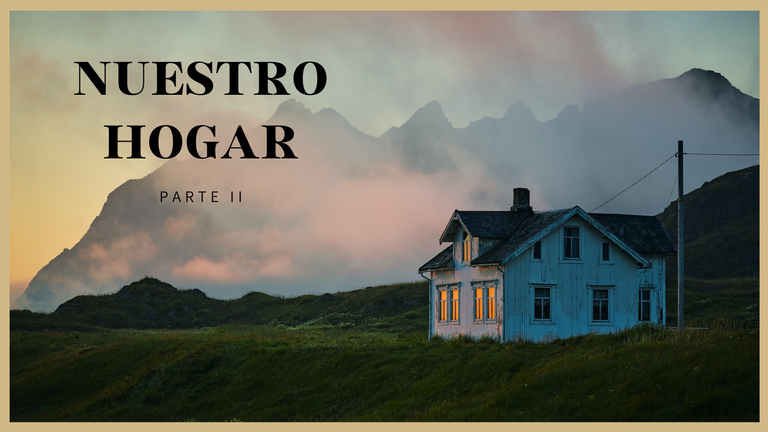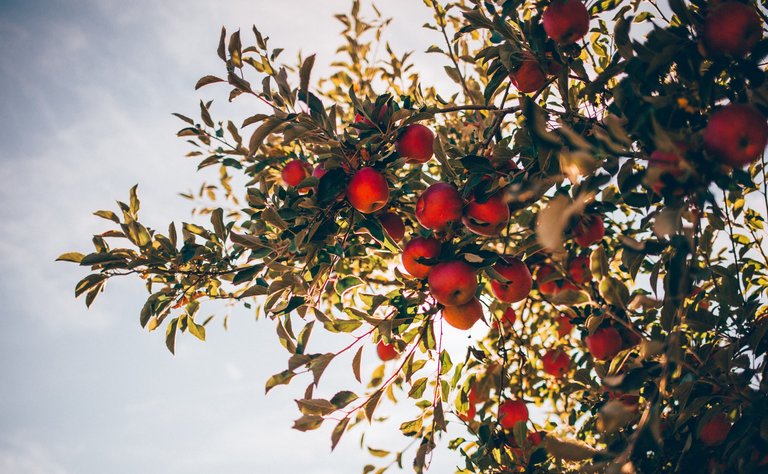
Partes anteriores | Previous parts
| LA VISITA | Parte I |
|---|

Mucho amor germina en la casualidad; tened siempre dispuesto el anzuelo, y en el sitio que menos lo esperáis encontraréis pesca.
— Ovidio
NUESTRO HOGAR
Nuestro hogar siempre fue motivo de admiración por ciertos aficionados a la historia. La casa de campo, donde mi padre y yo residíamos en prolongados periodos de reposo, ha sido superviviente de guerras civiles y cambios políticos abruptos. Fue construida por rebeldes armados en contra del gobierno dictatorial de Marcos Pérez Jiménez, aquí ocultaban sus armas, bajo pequeños depósitos subterráneos elaborados cuidadosamente para no permitir que ojos curiosos husmeen más donde no deben, dándole al resto de la casa la fachada de un lugar hogareño e inocente.
Cuando las cosas se agravaron, los rebeldes abandonaron este lugar y mudaron todo su arsenal hacia un sitio que hasta el día de hoy se desconoce. La casa quedó a merced de la soledad y el tiempo, quienes lamentablemente y, junto con la naturaleza, comenzaron a hacer lo suyo. Antes de que la mísera ominosidad desprestigiara por completo el último vestigio de belleza habitado en estas tierras, llegaron mis abuelos como mesías traídos por la esperanza.
Mis antecesores eran inmigrantes franceses, que lo único que llevaban consigo eran sus objetos materiales y sed de una nueva vida. Llegaron a apropiarse de estas tierras gracias a un abono heredado por mi abuela, el cual usaron para arrebatarles estas tierras al Estado. Mis abuelos eran citadinos y no sabían nada del campo, pero aprendían muy rápido, desde como sembrar hasta técnicas de construcción y carpintería.
Según contaban aquellos que lograron conocerlos, mi abuelo era un hombre sagaz, inteligente, afable y hábil. Sabía con quién juntarse y con quien no, y su personalidad tan cordial le permitió conocer mucha gente que le trajo bastante beneficio. Mi abuela, por otro lado, era muy conservadora, prefería el trabajo casero; no solo sabía bordado y pintura, sino que también era muy hábil con la maquinaria y cualquier otro tipo de herramienta de construcción que, en aquel entonces, usualmente usaban los hombres.
La casa fue deconstruida y vuelta a hacer, ya que mis abuelos querían que tuviera ese aspecto típico de la campiña francesa, con exteriores de piedra blanca y techos con pendientes pronunciadas, adornados con tejas de arcilla roja, con dos plantas, tres torres redondeadas y dos chimeneas exteriores. Las ventanas estaban hechas de fino tablero plano, con varios tipos de cristales y decoradas con persianas de colores pasteles. Los hastiales no podían faltar, y a mi abuelo se le ocurrió colocar cuatro de ellos. Sobre las puertas y ventanas se hallaban resaltados techos de ladrillos, para proteger las entradas de las lluvias. A un lado, la cochera, donde guardaban sus menesteres al principio, luego mudaron sus cosas hacia una de las torres y la cochera se convirtió en un depósito para herramientas de campo.
Los espacios subterráneos que los rebeldes utilizaban como arsenal de armas, se convirtieron en viveros para el cultivo de hongos, actividad que mis abuelos practicaban mucho, no solo para su sustento financiero sino también alimenticio. Dicho conocimiento fue trasladado a mi padre, quien aún hoy en día lo practica, pero solo como pasatiempo. Sobre mi hogar de campo, puedo decir tantas cosas, ubicado entre colinas alimentadas por planicies, que dirigen su atención hacia túneles arbolados, que te llevan a arroyos y otras maravillas naturales que aún la gente no conoce. Una región hermosa pero casi inexplorada del Estado Aragua.
De noche, somos preferencia para la luna, pues su claridad siempre nos ilumina cuando se halla en su imponencia más esplendorosa, otorgándole a los claros un aspecto fantasioso como de cuento de hadas. El silencio y el aire fresco hacen una combinación placentera, acompañando el entorno con colosales nubes que cubren el cielo tanto de día como de noche, permitiéndonos contemplar un cuadro magnífico desde la distancia.
Todo esto que estoy contando te podrá parecer maravilloso, incluso quizás, tu imaginación intenta recrear tal grato escenario lleno de beldad, pero debo decirte que para mí ya es algo trivial, ya que estoy muy acostumbrado a rodearme de tanta belleza. Lo más preciado para mí, más que mis preciadas posesiones celosamente resguardadas en la privacidad de mi habitación, es el árbol de manzanas que se halla a unos metros en la parte trasera de la casa.

Fue el último proyecto personal de mi madre antes de fallecer, adoraba las manzanas en todos sus aspectos, y su gusto fue tal, que aprendió como cultivarlas a través de la internet. Ella era una mujer paciente y muy metódica, respiraba gallardía ante tal proyecto que nunca permitió que sus ilusiones se apagaran. Fue tanta su insistencia que logró su cometido desarrollando su propio manzanal, al principio, todo iba bien, pero los manzanos; como si hubiesen sido afectados por una cruel enfermedad, morían uno a uno secándose desde la raíz por completo.
Todos excepto uno, quien logró persistir gozando de toda su vitalidad, se mantuvo firme y sano. Mi madre lo consideró un milagro y lo cuidó desde entonces como si fuera su hijo. El árbol producía enormes y exquisitos frutos con los que mi madre fue muy creativa desarrollando diferentes tipos de platillos; desde postres hasta salados, no había nada que la detuviera, hasta que la llama de la vida de mi madre se extinguió debido a los horrores del cáncer.
Mi padre y yo quedamos devastados, y como único consuelo para honrar su memoria, cuidamos del árbol como si fuese miembro de nuestra familia. Cada tarde, durante mi estadía allí, tomaba un libro de la biblioteca del despacho de mi padre y lo leía en voz alta a los pies del manzano. Le conté centenares de historias dulcemente como si se tratara de un hermano, sentado sobre sus enormes raíces que sobresalían macizas del suelo.
Anteriormente, te hablé de nuestros visitantes, el señor Mauricio Cárdenas; buen amigo de mi padre, y su odioso hijo Miguel. Se quedaron en dos de las habitaciones más espaciosas de la casa, las cuales se hallan en las torres izquierdas, cuyas únicas y enormes ventanas se puedes vislumbrar perfectamente desde el manzano.
El día de la visita de nuestros huéspedes, decidí terminar la lectura sin importar que ya se acercaba la noche. Llevé mi linterna y me senté a los pies del manzano. Cuando me disponía a leer, noté una figura que me observaba desde la ventana de una de las torres izquierdas. No fue difícil de distinguir, estaba seguro de que se trataba de Miguel. Su silueta era resaltada por la luz de fondo de la habitación, su rostro parecía brillante, a pesar de la tenue luz que había en ese momento.
Miraba fijamente hacia donde yo estaba; inmutable, como una estatua, no pude evitar sentir intriga sobre ese repentino gesto. Recordé cuando chocamos accidentalmente al entrar a la casa y nuestras miradas se conectaron de una forma extraña, pero en este caso, fue aún más especial. Sus ojos brillaban como dos radiantes diamantes, apuntando directamente hacia mí. Pensé en hacerle una seña, pero luego erradiqué la idea cuando escuché la voz de Amaglia, la empleada doméstica de la casa, llamándome para cenar.
Al devolver mi vista hacia la ventana, ya Miguel no estaba y la luz dentro de la habitación se había apagado. Suspiré, intentando olvidar lo que sucedió, tomé el libro, me despedí de mi hermano, el árbol, y volví corriendo a la casa.
CONTINUARÁ...

Much love germinates in chance; always have the hook ready, and in the place where you least expect it you will find fish.
— Ovidio
OUR HOME
Our home has always been a source of admiration for certain history buffs. The country house, where my father and I resided in exhausting periods of rest, has been a survivor of civil wars and abrupt political changes. It was built by armed rebels against the dictatorial government of Marcos Perez Jimenez, where they hid their weapons, under small subway tanks carefully crafted to not allow prying eyes to pry any further where they shouldn't, giving the rest of the house the facade of a homey and innocent place.
When things took a turn for the worse, the rebels abandoned this place and moved their entire arsenal to a site that to this day remains unknown. The house was left to the mercy of loneliness and time, which unfortunately, along with nature, began to do its thing. Before the miserable ominousness completely discredited the last vestige of beauty inhabited in these lands, my grandparents arrived as messiahs brought by hope.
My ancestors were French immigrants, who brought with them only their material objects and thirst for a new life. They came to appropriate these lands thanks to a fertilizer inherited by my grandmother, which they used to take these lands from the State. My grandparents were city dwellers and knew nothing about the countryside, but they learned very quickly, from how to plant to construction and carpentry techniques.
According to those who knew them, my grandfather was a shrewd, intelligent, affable, and skillful man. He knew who to get together with and who not to get together with, and his very cordial personality allowed him to meet many people who brought him a lot of benefits. My grandmother, on the other hand, was very conservative, preferring homemaking; not only did she know embroidery and painting, but she was also very handy with machinery and any other type of construction tools that, at that time, were usually used by men.
The house was deconstructed and redone, as my grandparents wanted it to have that typical French countryside look, with white stone exteriors and steeply pitched roofs, adorned with red clay tiles, with two stories, three rounded towers, and two exterior chimneys. The windows were made of thin flat board, with various types of glazing, and decorated with pastel-colored shutters. The gables could not be missing, and my grandfather came up with the idea of placing four of them. Over the doors and windows, there were brick ceilings, to protect the entrances from the rains. On one side, the garage, where they kept their belongings at first, then they moved their things to one of the towers and the garage became a storage room for field tools.
The subway spaces that the rebels used as an arsenal of weapons, became nurseries for the cultivation of mushrooms, an activity that my grandparents practiced a lot, not only for their financial sustenance but also for food. This knowledge was passed on to my father, who still practices it today, but only as a hobby. About my country home, I can say so many things, located between hills fed by plains, which direct your attention to forest tunnels, which lead you to streams and other natural wonders that people still do not know about. A beautiful but almost unexplored region of Aragua State.
At night, we prefer the moon, because its clarity always illuminates us when it is at its most splendid, giving the clearings a fantasy aspect like a fairy tale. The silence and the fresh air make a pleasant combination, accompanying the environment with colossal clouds that cover the sky both day and night, allowing us to contemplate a magnificent picture from a distance.
All this I am telling you may seem wonderful, perhaps even, your imagination tries to recreate such a pleasant scenery full of beauty, but I must tell you that for me it is something trivial, since I am very used to surrounding myself with so much beauty. The most precious thing to me, more than my prized possessions jealously guarded in the privacy of my room, is the apple tree that stands a few feet away at the back of the house.
It was my mother's last personal project before she passed away, she adored apples in all their aspects, and her taste was such that she learned how to grow them through the internet. She was a patient and very organized woman, she breathed gallantry before such a project that she never allowed her illusions to be extinguished. Her insistence was such that she achieved her goal by developing her apple orchard. In the beginning, everything was going well, but the apple trees, as if they had been affected by a cruel disease, died one by one, drying up completely from the roots.
All except one, who managed to persist with all his vitality, remained strong and healthy. My mother considered it a miracle and cared for it ever since as if it were her child. The tree produced enormous and exquisite fruits with which my mother was very creative in developing different types of dishes; from desserts to savory, there was no stopping her, until the horrors of cancer extinguished the flame of my mother's life
My father and I were devastated, and as our only consolation to honor her memory, we cared for the tree as if it were a member of our family. Every afternoon during my time there, I would take a book from the library in my father's office and read it aloud at the foot of the apple tree. I told him hundreds of stories sweetly as if he were a brother, sitting on its huge roots that protruded from the ground.
Earlier, I told you about our visitors, Mr. Mauricio Cardenas, my father's good friend, and his hateful son Miguel. They stayed in two of the most spacious rooms of the house, which are located in the left towers, whose unique and enormous windows can be perfectly glimpsed from the apple tree.
On the day of our guests' visit, I decided to finish reading no matter that night was approaching. I took my flashlight and sat down at the foot of the apple tree. As I was about to read, I noticed a figure watching me from the window of one of the left towers. It was not difficult to distinguish, I was sure it was Miguel. His silhouette was highlighted by the backlight of the room, his face seemed bright, despite the dim light at that moment.
He was staring straight at me; immutable, like a statue, I couldn't help but feel intrigued by this sudden gesture. I remembered when we accidentally collided when we entered the house and our gazes connected strangely, but in this case, it was even more special. Her eyes sparkled like two radiant diamonds, pointing straight at me. I thought about beckoning her, but then eradicated the idea when I heard the voice of Amaglia, the housemaid, calling me to dinner.
When I looked back to the window, Miguel was gone and the light inside the room had gone out. I sighed, trying to forget what happened, took the book, said goodbye to my brother, and the tree, and ran back to the house.
TO BE CONTINUED...



Texto traducido con Deepl | Text translated with Deepl
 Enlace aquí
Enlace aquí
Esta publicación ha recibido el voto de Literatos, la comunidad de literatura en español en Hive y ha sido compartido en el blog de nuestra cuenta.
¿Quieres contribuir a engrandecer este proyecto? ¡Haz clic aquí y entérate cómo!
https://inleo.io/threads/universoperdido/re-universoperdido-cxcurffr
The rewards earned on this comment will go directly to the people ( universoperdido ) sharing the post on LeoThreads,LikeTu,dBuzz.
Post manually reviewed. 😊
Thankfull!
Yay! 🤗
Your content has been boosted with Ecency Points, by @universoperdido.
Use Ecency daily to boost your growth on platform!
Support Ecency
Vote for new Proposal
Delegate HP and earn more
¡Felicitaciones!
1. Invierte en el PROYECTO ENTROPÍA y recibe ganancias semanalmente. Entra aquí para más información.
3. Suscríbete a nuestra COMUNIDAD, apoya al trail de @Entropia y así podrás ganar recompensas de curación de forma automática. Entra aquí para más información sobre nuestro trail.
4. Creación de cuentas nuevas de Hive aquí.
5. Visita nuestro canal de Youtube.
Atentamente
El equipo de curación del PROYECTO ENTROPÍA